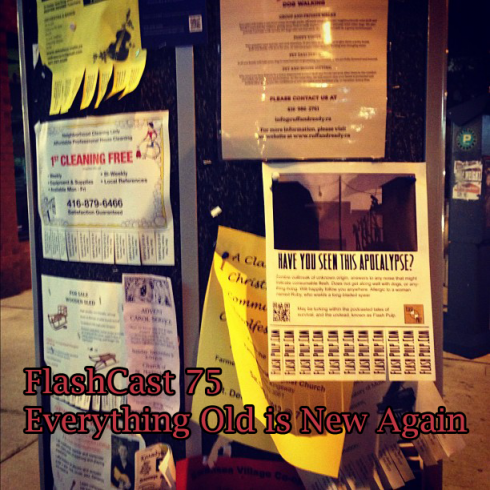Welcome to Flash Pulp, episode three hundred and five.
 Tonight we present Machined: a Collective Detective Chronicle, Part 1 of 1
Tonight we present Machined: a Collective Detective Chronicle, Part 1 of 1
[audio:http://traffic.libsyn.com/skinner/FlashPulp305.mp3]Download MP3
(RSS / iTunes)
This week’s episodes are brought to you by the The Hollywood Outsider.
Flash Pulp is an experiment in broadcasting fresh pulp stories in the modern age – three to ten minutes of fiction brought to you Monday, Wednesday and Friday evenings.
Tonight we present a tale of digital detection and online exposure, of death, defeats, and endings.
Machined: a Collective Detective Chronicle
Written by J.R.D. Skinner
Art and Narration by Opopanax
and Audio produced by Jessica May
As she stepped forward, GoJo was feeling as if the auditorium had doubled in size since she’d shuffled through the backstage area.
She wasn’t used to wearing anything heavier than a t-shirt, and the suit jacket her mom had talked her into had brought on a sweat well before she was roasting beneath the theater lights.
Without thinking she put on the same fake smile she carried through family gatherings, but, when the familiar first slide flickered into view, the grin edged on genuine.
 “Hello,” she said, “my name is Josette Yates. I flew here from Michigan, but, like the rest of you, I’ve really come from the internet.”
“Hello,” she said, “my name is Josette Yates. I flew here from Michigan, but, like the rest of you, I’ve really come from the internet.”
Her delivery caught a few smirks, but the audience was generally silent.
”I’m part of The Collective Detective – do I have any fellow Editors out there? Any contributors?”
That raised some clapping, and a rear-row response that was garbled by the time it reached the stage.
She moved on, hoping it was something positive.
“Well, for those who aren’t so familiar: We’re researchers who use the mistakenly released archive of Internet traffic from the Bush-era tapping to look into unsolved crimes. We deal mainly in homicides, but there’s a small group of us who experiment in our spare time with looking for fraud.
“A hobby in our hobby, if you will.
“Sometimes we find things the police missed; sometimes we get lucky; most often, though, we come up empty handed.
The slides, which had gone from the proper spelling of her name to a vague structural chart of the organization, now stopped on a puffy-faced man. He might have been mistaken for a younger, plumper, Nicolas Cage.
“Do you know this guy?” she asked the crowd.
Several answers were shouted back, and she assumed one was correct.
“That’s right,” she continued, “it’s tech wonder Byron Newman – you may be familiar with his prolific social media updates, his savvy venture capital investments, his extensive complaints about poor design, or his surprisingly encouraging private correspondence – but, do you know THIS guy?”
Another puffy-faced man, bearded and mistakable as only perhaps a vagrant.
“This poor fella is Norris Barker, and at the time of the photo, he was caught up in a con game. Now, as I said, fraud isn’t really what the Collective focuses on. Murder is our business.
“Still, there are a few of us who like to dig through the archives with pattern matching software, just to see what we might stumble across. You’d be surprised how many former Nigerian ministers live in the US.
“In 2007, Norris was in love. He’d met a woman online, Sherry, who he spent hours exchanging emails, texts, tweets, and private moments with daily. She was a married woman, but her husband was a horrible sort. He was a systems administrator for the DMV, and always ready to leap to the keys to sooth her.”
The projected image shifted and a young Byron Newman filled the screen.
“Before I can explain 2007, though, I first have to go back to 1999. Our guru was three years out of university and full of ideas. Better yet, he’d managed to position himself on top of a mountain of cash, and was working with Big Thoughts Inc. in a converted Victorian house in San Francisco.
“He’d coaxed his small team into writing millions of lines of code, and he was well on his way to living his legendary no-sleep lifestyle.
“Six months later, though, the funding was gone – just as it was for every pie-in-the-sky project of the time.
“They did their best to license their technology to stay afloat. They’d built an advanced linguistics program, and they tried to cram it into being an automatic help agent for websites. You know, a box pops up with: ‘Hi, I’m Maria, how may I help you?’
”It would have been an easy task for the completed program, but the system hadn’t been designed to be dumbed down.
“They were all fired before it was finished.”
The presentation faded to a screenshot of the Wall Street Journal’s website pronouncing Big Think dead.
After allowing a beat to build dramatic tension, GoJo continued.
“Byron didn’t stop though. He saved a hard drive from the inevitable liquidation sale and brought it home, then started a race with his severance package.
“You can see his time disappear like a shadow in the logs. His porn browsing goes down, he stops searching for any sort of game walkthroughs, he even drops out of most of his forums, where he’d built up a reputation as something of a forward-thinking tech pundit.
“Two years later, with his benefits long gone and most of the things he owned sold, he’d covered a lot of distance. The problem, of course, is that at that point he also desperately needed more money.
“He’d been testing his work by launching instances and sending them into chatrooms. His early attempts weren’t terribly successful, but, by the time he was broke, he was consistently able to fool most reality TV fans. His program was not only capable of passing the Turing test, it had developed relationships and was continuing conversations based on snippets it was grabbing from news sites and other forums.
“Given his shut-in status, his application soon had more friends than he did. Byron had no one else to ask for money, but his code did. He started skewing his work towards grifting.
“This was no identity theft or one time Facebook con. He didn’t want a few hundred at a time, he needed thousands, perhaps millions, to properly complete his work.
“I came in not long after.”
A younger Josette appeared above the stage, though she wore the same fake smile. She was standing in front of a dilapidated country estate.
“Well, sort of. That’s actually me from just a year ago, after six months of investigating. You may notice that I look kind of spooked – that house felt haunted to me, even though I don’t believe in such a thing.
“See, when Newman started using his chat app to talk lonely folks on the internet into sending along money, traffic from his place suddenly increased ten fold. It’s a solid bit of coding, and most of the text it spits out is pretty original, but there was so much of it that duplication was inevitable, especially since most of the ploys were set up by Byron himself, and just the details changed from person to person.
“Tony’s ex-wife is a horrible woman and he needs money to feed himself because she took it all in alimony. Tammy’s a single mom with a naughty imagination and her kids need shoes. Martin’s Ma will be kicked from the home if he can’t pull together the monthly bill.
“That sort of thing.
“This is all from 2002 to 2007, but only uncovered eighteen months ago. We were hunting Nigerian ministers and came across two hundred and seventy-six battered Sherry-alikes. It seemed like a mass copy-and-replace job until we realized how much traffic he was pushing around.
“There was a hiccup in 2005, when Byron moved to the country, but it was easy enough to find him at his new nest – he was using twice as much bandwidth.”
The view flipped to an overhead satellite image of the sprawling grounds.
“In a case of literalism, Newman built a server farm on his farm and kept working. It’s hard to say how much of his time was invested in advancing his original idea, and how much was focused on squeezing cash from people, but the money continued to pour in. He did it in small bites, small enough that the bilked wouldn’t make a fuss, or even know they were anything but a good samaritan, but, in the end, Byron was maybe best described as a linguist and not a security guy.”
The image switched back to Norris Barker’s vagabond face.
“Barker, on the other hand, was. He was also, as I mentioned, in love. He probably thought he was confronting a vicious husband when he bought that gun – or perhaps he’d figured it all out. He posted nothing online that might give us a hint. It certainly must have seemed odd, though, that she’d gone through so much trouble to hide the source of her messages. Maybe he thought it was the brute’s work.
“The last thing he said to Sherry was in an email that read only, ‘I’m coming.’
“We know Byron Newman died August 25th, 2007, because Norris immediately punched a confession into his smartphone, explaining to his brother that he was planning to flee the country. That message was sent to a tower within a kilometer of the farm.
“We haven’t been able to find evidence of him since.
“What the broken-hearted murderer didn’t know, however, was that Newman had built the perfect alibi for him. Byron had long returned to his role of pervasive online tech guru, tweeting extensively, posting commentaries, and writing blog posts between rounds of spending stolen money.
“The problem was, he enjoyed the attention, but not the distraction. One day he simply split off a new instance of his program, named it after himself, and set it to keeping the world updated with his wit while he was blowing weekends in Vegas. Like everything he touched, it began to expand. It started handling all of the complex banking necessary to keep his assets hidden; it started paying the bills necessary to keep his lights on and the servers running; it started trolling Craigslist for local yard guys who accepted online payments.
“Twelve months ago we took our information to some scary guys in government-issued suits, and they promptly thanked us and showed us the door. A month after that, they came back and asked for our help figuring out what all had happened.
“Fifteen minutes ago, just before I took the stage, what we’ve begun to think of as Lord Byron’s Machine was taken offline.
The final image of the presentation appeared: A live shot of Newman’s last status update, hanging, twenty-minutes old, at the end of a stream of quick-fire chatter.
It read, “Can’t wait to see what Josette Yates’ secret TED announcement is.”
There was no follow up.
GoJo’s smile was fully real now, though it had taken on a hint of sadness.
She cleared her throat and said, “thank you for your time.”
Flash Pulp is presented by http://skinner.fm, and is released under the Canadian Creative Commons Attribution-Noncommercial 2.5 License.
Freesound.org credits:
Text and audio commentaries can be sent to comments@flashpulp.com – but be aware that it may appear in the FlashCast.
– and thanks to you, for reading. If you enjoyed the story, tell your friends.

 Peeling off his smock – an action Mulligan knew he referred to as “going undercover” – Mike threw a hand-sign to his manager that obviously meant “I’m taking a minute,” then strolled past the line of tchotchke-ball-dispensing change collectors and through the automatic doors.
Peeling off his smock – an action Mulligan knew he referred to as “going undercover” – Mike threw a hand-sign to his manager that obviously meant “I’m taking a minute,” then strolled past the line of tchotchke-ball-dispensing change collectors and through the automatic doors. “Hello,” she said, “my name is Josette Yates. I flew here from Michigan, but, like the rest of you, I’ve really come from the internet.”
“Hello,” she said, “my name is Josette Yates. I flew here from Michigan, but, like the rest of you, I’ve really come from the internet.” In the living room beyond, Jimmy Stewart was undertaking his yearly debate with a bumbling angel.
In the living room beyond, Jimmy Stewart was undertaking his yearly debate with a bumbling angel. Its soggy lawn bristled with tasteful Christmas decorations, and, before entering, they’d paused to take in the powerless white lights and wrapped trees.
Its soggy lawn bristled with tasteful Christmas decorations, and, before entering, they’d paused to take in the powerless white lights and wrapped trees.
